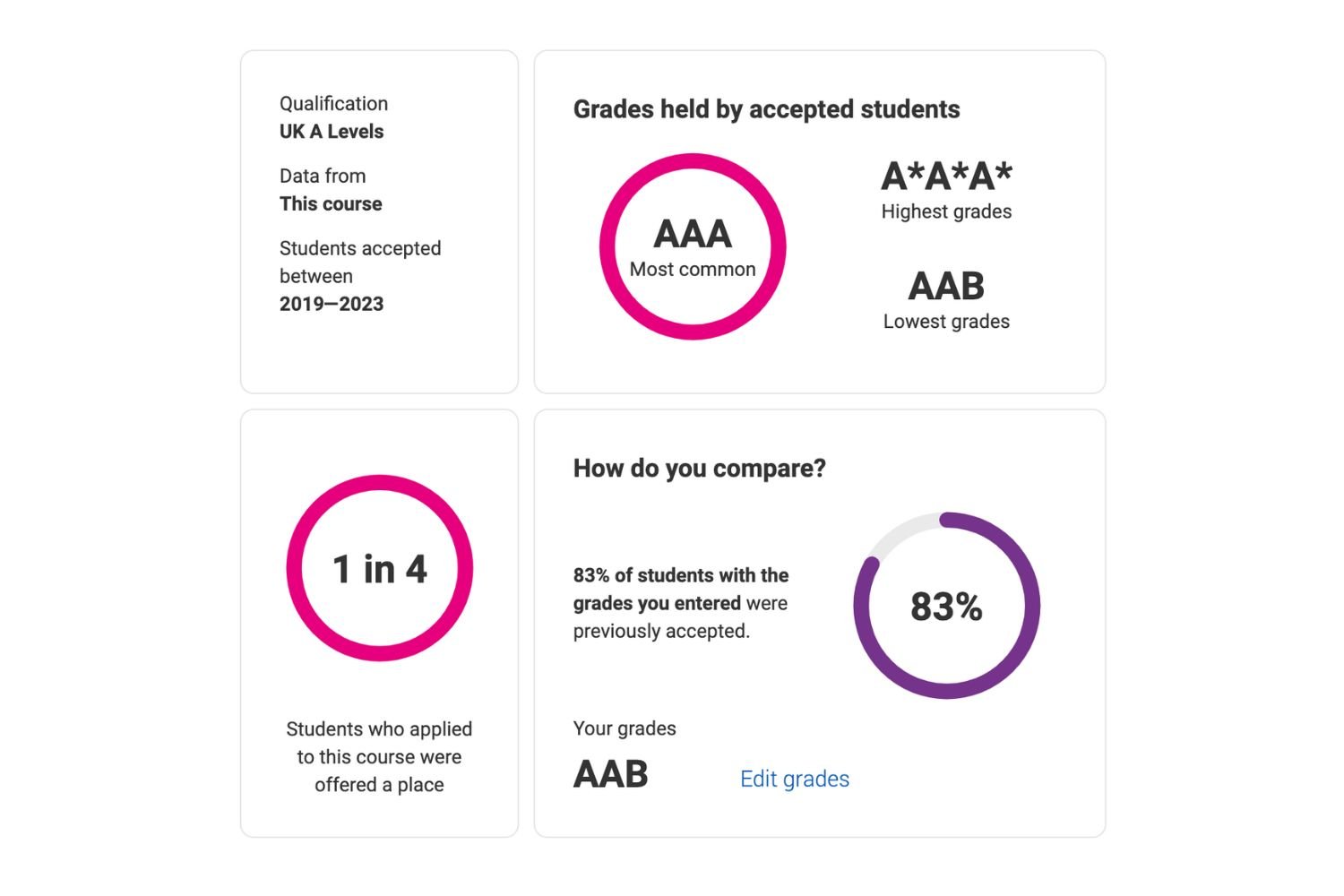Articles
Something new (nearly) every week!
Search all articles

Applying for highly competitive courses
Whether you are brand new to the university application process, or have been working in the education sector for as long as I have, you’ll undoubtedly have heard teachers, advisers and university staff talking about “highly competitive courses”.
It’s a term bandied about with little thought. On one hand teachers use it to make sure students take their applications seriously, and don’t make assumptions about their chances of getting into university. On the other, it is used by universities to make their courses seem more attractive; the more unattainable a course is, the more people want to get into it!
So, as students, applying through UCAS for the first time, how do you know which courses are genuinely “highly competitive”, and if they are, do you really need to do anything different with your application?

Preparing for A-level results day: Clearing and Confirmation
A-level results come out on Thursday 14th August.
This is a super-important date, because it’s the date when many students will find out whether they’ve been accepted to university, and it’s the date when Clearing opens, and all those last minute opportunities come in to play.
It is a day of high stress for many students, parents and teachers, and there are an insane array of possible outcomes for students in different scenarios.

University Admissions Tests: Everything you need to know right now!
I’ll be honest. I’m not really much of a fan of admissions tests for university.
However, university admissions tests exist, and for a number of courses and universities, they are a straightforward requirement.
And so this article is designed to help you navigate your way through them, understand what they are for and how you go about taking them.

Ten things you should know about the new UCAS Personal Statement for 2026
The other day I asked ChatGPT what it could tell me about the new UCAS Personal Statements for 2026. “Of course” it said before going on to explain that the new Personal Statement would consist of six specific questions. When I suggested that it was wrong, and there would be only three questions, it admitted “You're right!” before listing the wrong three questions.
ChatGPT, you see, gets its information from the wild west of the internet, and clearly on this particular subject, the internet doesn’t have a clue what it’s talking about.
So instead of trusting AI to sort the truth from the myths, here are ten actual, real, true things that you should know about the new UCAS Personal Statements for 2026.

Making big decisions with a bias to action
A few weeks ago I wrote a piece about five mindset changes that I’d learned about in “Design your Life” by Bill Burnett and Dave Evans. I described one of these mindsets as “try stuff”, but the term they use for it is having a “bias to action”. For me it’s been such a game changer in my life that I thought it worth exploring a bit more deeply.
What is a “bias to action”? What does it look like when making long term decisions? And how can I start to make it a part of my mindset?

Personal Statement checker
Have you finished your UCAS Personal Statement and want to know if it's any good?
Are you a parent who is looking at their child’s statement so you can give them feedback?
Or are you a teacher or adviser faced with providing feedback on lots of Personal Statements?
If so, this checklist is for you!
Just check for these eight essentials, and you’ll have a pretty good idea of whether your statement is good to go!

Is it OK to apply for two different subjects through UCAS?
It's that time of year when loads of students are finalising their UCAS choices, and a question consistently asked of advisers is “Can I apply for two different subjects?”
Well, as with most things about applying to university, the answer is “it depends…”
But what exactly does it depend on?

Wait… has the UCAS Personal Statement just been scrapped?
Earlier in the summer, just after the schools broke up in England, UCAS made an important announcement about the UCAS Personal Statement.
If you just looked at the headlines, you’d think that the Personal Statement had been banished forever. But in truth the Personal Statement is not being scrapped at all; it’s being reformed and restructured.
And it’s not happening immediately either.
So, what is the truth behind all those misleading headlines?

New UCAS historical entry grades data: Just how useful is it?
For the very first time UCAS have introduced information on their website that attempts to show you what grades students actually had when they entered different courses, rather than just showing the university’s published entry grades.
It turns out, you see, that nearly 50% of students get into their course with qualifications below the level of those universities published by the universities.
So when a course says you need AAB to get in, it turns out, you don’t!
This new data is aimed at making this all a bit clearer and more transparent, so that you can make better decisions about which courses to apply to.

How (and why) to build slack into your life.
I read a LinkedIn post the other day about building ‘slack’ into our lives, by a growth and performance consultant called Dr Mark Thorley.
In his post he talks about how we, as a society, seem to be all consumed with doing more. We constantly strive to be our best selves whether at work or in our personal lives.
Work hard, play hard, do more, go on better holidays, get a bigger car, spend more, get a bigger house, a bigger mortgage, and a bigger debt on our credit cards.
And what this all really comes down to is that we constantly get stressed simply trying to meet the expectations of others.
And yet, those who seem to be the very most successful at surviving in times of uncertainty, and can thrive when things go wrong, are those who have managed to build a little ‘slack’ into their lives.

Why are some universities so ridiculously hard to get into?
Whether you are applying to university yourself, or are helping and advising students, you’ll have all heard the same stories: a student predicted A*A*A*, with an excellent Personal Statement and Reference gets rejected from a top university. Come A-level results day, some of these students will find themselves with no offers at all, and might even find themselves as a headline in the press.
But why is this? Why are amazing, talented students so frequently finding themselves rejected by universities, when there seems to be nothing wrong at all with their applications?
Well, to understand, we need to go back a few steps.

UCAS Extra and Clearing: A failsafe for the unexpected
Sometimes, the UCAS system might seem a bit clunky and a bit restrictive, and for many students it seems a bit complicated. But in the main, it seems to work for most people, with some 384,000 students ending up at their firm or insurance choices last year.
Yet each year, there are a whole bunch of students who the main process doesn’t quite work properly for. That’s where UCAS Extra and Clearing come in; to provide you with a failsafe for when the unexpected happens.
You might not plan on using either of these, but trust me, it's well worth spending the next five minutes reading all about them, so that you have that failsafe ready, should you need it!

Five to two: Making your final UCAS choices
As I write, many of you will be receiving offers from your chosen universities. It’s a nervous time, and while some of you will be getting offers promptly within days of applying, others may need to wait weeks, or even months for a decision.
So when you get all these decisions from universities, what happens next? Well, the response is now up to you.
The universities will all be hoping you’ll choose them. They’ll be sending you emails, inviting you to visit days, perhaps even sending you a brochure or two in the post. But the reality is that the power now rests with you. You get to choose which offers to accept!
So, how does it all work, and what should you be thinking about as you accept your offers?

University admissions interviews: What they’re for, what they’ll include and how to prepare for them!
Potentially one of the most intimidating parts of the whole university selection process is the admissions interview.
Most advice I’ve seen on interviews tends to revolve around what questions you might be asked and what to wear. I’ll get to these a bit later, but I’ll start by looking a little deeper into why you are being interviewed, what structures the universities might use, who might be involved in these, and what impact it could have on your admissions. The more you know about this, the more sense the whole process will make, and the better you can prepare yourself.

Preparing a portfolio for Art and Design
Firstly, I’d better make clear that I am not a specialist in art and design. While I have been at the sharp end of making admissions decisions on applications for a variety of subjects, I have not been an admissions tutor for art or design subjects.
What I have had, however, is the opportunity, to work with some amazing art teachers and lecturers (most notably at Loughborough University and the University of South Wales). I have listened to them talk about what they like to see in portfolios, and watched them discuss individual portfolios with the students who created them.
I have attempted to distil what I have learned into a simple guide to preparing your portfolio. You’ll soon realise, however, that it will take more than a short article on a website for you to fully understand what an amazing portfolio will look like specifically for you. So take this article as just the beginning, a jumping off point if you like; a solid platform from which to start your journey.

Just who are admissions tutors anyway?
This newsletter is all about you making better university choices, and of course, making a great application. But what of the universities? They make decisions too, and most specifically they’ll decide whether to accept your application and offer you a place!
In this article, I’ll give you a bit of insight into how universities make decisions, who makes the decisions, and the processes they use.

Just how ambitious should you be with your initial five UCAS choices?
The basic principle behind the UCAS system is that it balances the need for students to have a range of choices when they apply, with the need for universities to have some kind of predictability in working out how many offers to make. So, for many years, students have been able to make up to five choices. Any more, and the universities will simply be swamped with applications that are not realistic or necessary. Any less and you could run the risk of not getting an offer of a place that suits you.
The system works reasonably well most of the time, provided students are realistic with their applications, and provided universities are transparent with their entry criteria, and consistent with their offers. This year nearly 79% of A-level students secured their firm choice (ie. their first choice course), while 12% got into their insurance choice.
So, how do you make sure the system works well for you? How do you turn all that research, all those possible choices, into a list of five courses on your application form that gives you the best chance of getting into a course that you really want to do? Is it as simple as listing your five favourite courses? I’m afraid not. But neither is it some dark art where you need to have some amazing insight and specialist knowledge to get it right. Just read on, and I’ll try to make it as simple as possible.
